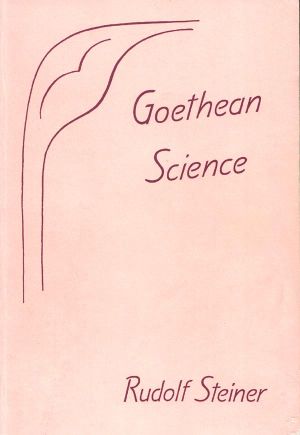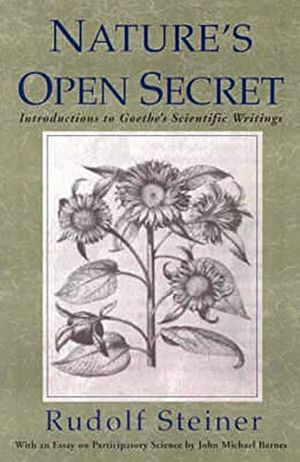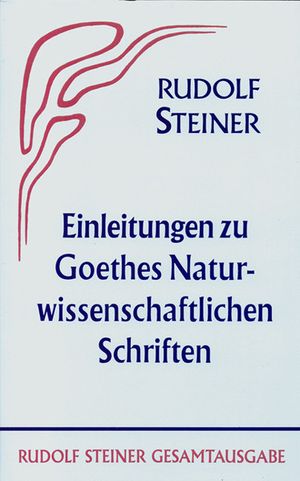GA 1



Goethean Science
Einleitungen zu Goethes Naturwissenschaftlichen Schriften (1884 - 1897)
Zugleich eine Grundlegung der Geisteswissenschaft (Anthroposophie)
In this early work, Rudolf Steiner already characterised the philosophical basis of the anthroposophical spiritual science later developed by, which seeks to explore the spiritual world through pure spiritual perception. The core idea is that this purely spiritual perception already begins with thinking:
„Whoever grants thinking its perceptive capacity that goes beyond sense perception beyond the perception of the senses, he must of necessity also must of necessity also attribute to it objects that transcend the mere beyond the mere sensuous reality. The objects of thinking, however, are the ideas. By taking possession of the idea, thought of the idea, it merges with the primordial ground of the of the world's existence; that which works outside enters the spirit of man. enters the spirit of man: he becomes one with objective reality at its highest highest potency. Becoming aware of the idea in reality is the true communion of man.
Thinking has the same meaning towards the ideas as the eye to the light, the ear to the sound. It is organ of conception.
This view is able to unite two things, which today are considered totally incompatible: empirical method... and idealism as a scientific view of the world. It is believed that the recognition of the former entails the rejection of the latter. the rejection of the latter. This is not at all correct. If, of course, one considers the senses to be the only organs of perception of an objective reality, one must of an objective reality, then one must come to this one must come to this view. For the senses supply only those connections between things that can be traced back to mechanical laws. And thus mechanical view of the world as the only true form of such a view. of such a view. In this one commits the mistake of the other equally objective components of reality, which can not be traced back to mechanical laws. laws, are simply overlooked. The objectively given does not at all coincide with the sensually given, as the mechanical the mechanical conception of the world believes. The latter is only half of the given. The other half of the same are the ideas, which are also the object of experience, albeit a higher one, whose organ is thought. Also ideas are also accessible to an inductive method.
The empirical science of today follows the quite correct method: to hold fast to the given; but it but it adds the unwarranted assertion that this method can only deliver sensuous facts. Instead of the, how[1] we arrive at our opinions.., it determines a priori the "what" of them. The only satisfactory conception of reality is empirical method with idealistic research results. This is idealism, but not the kind that pursues a nebulous, dreamy unity of things, but one that understands the concrete the concrete idea-content of reality just as experientially as today's hyperexact research seeks the factual content. factual content.“ (Lit.:GA 1, p. 125f)
Contents
Through the mediation of Karl Julius Schröer, Rudolf Steiner edited Goethe's Natural Scientific Writings (see GA 1a-e) for Kürschner's "Deutsche National-Litteratur" (German National Literature) between 1884 and 1897. The intensive examination of Goethe's way of looking at things was the starting point for Steiner's epistemological work and also had an effect on his entire oeuvre. All of his introductions are included in this volume.
I: Introduction
II: How Goethe's Theory of Metamorphosis Arose
III: How Goethe's Thoughts on the Development of the Animals Arose
IV: The Nature and Significance of Goethe's Writings on Organic Development
V: Concluding Remarks on Goethe's Morphological Views
VI: Goethe's Way of Knowledge
VII: The Arrangement of Goethe's Natural-scientific Writings
VIII: From Art to Science
IX: Goethe's Epistemology
X: Knowing and Human Action in the Light of the Goethean Way of Thinking
XI: Relationship of the Goethean Way of Thinking to Other Views
XII: Goethe and Mathematics
XIII: Goethe's Basic Geological Principle
XIV: Goethe's Meteorological Conceptions
XV: Goethe and Natural-scientific Illusionism
XVI: Goethe as Thinker and Investigator
XVII: Goethe Against Atomism
XVIII: Goethe's World View in his Aphorisms in Prose
Notes
Literature
- Rudolf Steiner: Nature's Open Secret: Introductions to Goethe's Scientific Writings. CW 1. Translated by John Barnes and Mado Spiegler. Anthroposophic Press Inc 2010. ISBN 978-0880107150; eBook ASIN B005NDP5BS English: rsarchive.org German: pdf pdf(2) html mobi epub archive.org
- Rudolf Steiner: Goethean Science, translated by William Lindeman, The Mercury Press 1988, ISBN 978-0936132921 English: rsarchive.org German: pdf pdf(2) html mobi epub archive.org
- Rudolf Steiner, : Goethe the Scientist, translated by H.B. Monges, Anthrosposophic Press 1950
German
- Rudolf Steiner: Einleitungen zu Goethes Naturwissenschaftlichen Schriften, GA 1 (1987), ISBN 3-7274-0011-0; Tb 649, ISBN 978-3-7274-6490-4 English: rsarchive.org German: pdf pdf(2) html mobi epub archive.org
Original editions
 |
References to the work of Rudolf Steiner follow Rudolf Steiner's Collected Works (CW or GA), Rudolf Steiner Verlag, Dornach/Switzerland, unless otherwise stated.
Email: verlag@steinerverlag.com URL: www.steinerverlag.com. Index to the Complete Works of Rudolf Steiner - Aelzina Books A complete list by Volume Number and a full list of known English translations you may also find at Rudolf Steiner's Collected Works Rudolf Steiner Archive - The largest online collection of Rudolf Steiner's books, lectures and articles in English. Rudolf Steiner Audio - Recorded and Read by Dale Brunsvold steinerbooks.org - Anthroposophic Press Inc. (USA) Rudolf Steiner Handbook - Christian Karl's proven standard work for orientation in Rudolf Steiner's Collected Works for free download as PDF. |
References
- ↑ cf. Goethe's well-known saying: Consider what, more consider how. (Faust II, Act 2)
